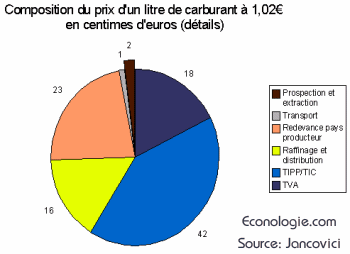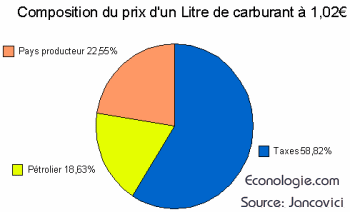Everyone knows that petroleum fuels are heavily taxed. But what exactly are the weight and nature of these taxes and how are the different costs of a liter of fuel distributed? This article attempts to answer this question briefly.
On the basis of a liter of petroleum fuel sold for € 1,02, here is what makes up this price on the following parity: $ 1,2 = € 1 (since crude is quoted in $) and this for France.
Source: Jancovici, Full Please 132 page
a) € 0,02: exploration and extraction of crude oil
b) € 0,01: Crude oil transportation
c) € 0,23: price of crude returned to the producing country (when it is paid ...)
d) € 0,16: refining and distribution (from the pump operator is included in these 16 cents)
e) € 0,42: domestic tax on petroleum products (TIPP) now called Interior Tax on Consumption (ICT)
f) € 0,18: VAT
diagram
Details of the cost of a liter of petroleum fuel:

We can simplify and bring these cost under 3 sample type: producer countries, oil and government.

Analysis
a) As shown in the 2nd diagram, it is quite easy to simplify the cost of a liter of fuel as follows:
- 6/10 taxes therefore benefits for the State
- 2/10 of turnover for oil companies
- 2/10 royalty therefore benefits for the producer countries
The distinction between profits and turnover is important: the oil companies earning much less the final on a liter sold as 2 other parts.
b) The technology having its limits to reduce the expenses of the oil companies, to increase their profits, the latter must either sell more oil, or "nibble" on the shares of the 2 others.
Taxation is difficult to avoid legally, by cons do not pay the fee of the producing country is possible.
This explains the many relationships between our politicians and leaders of the producing countries in order to obtain concessions for national companies.
For example, TOTAL has an oil field in Iraq equivalent to the reserves contained in US territory. Let's not even talk about Africa where where there is oil (like any other wealth), conflicts suddenly appear… Conflicts which allow certain companies to take advantage of resources in a “profitable” climate.
c) An increase the price of crude is largely favorable to the profits of oil companies when they do not have to pay the producing country. The Elf affair showed that not all tankers were "counted" for this obvious reason. The record profits of the Oil companies of the years 2005 and 2006 would tend to prove thata large part of their oil is not paid to producing countries!
d) increase in crude prices is favorable to tax revenues because VAT is proportional to the price excluding VAT.
Conclusion: oil a miracle product for economists
Our dependence on oil is such that, not being able to do without it because the technology does not exist (at least for transport), a constant increase in prices will not be significant of a fall in demand. This unlike all other products on the market.
These pages have their origin on the forum of discussing : learn more and offer questions / answers about energy.
Learn more
- Senate report on costs and fuel price changes
- Crude oil money

